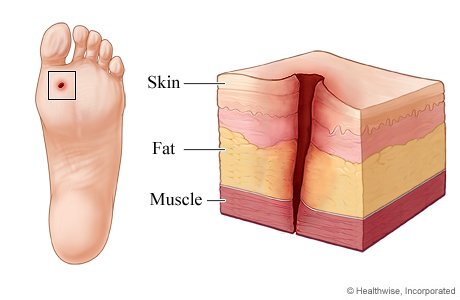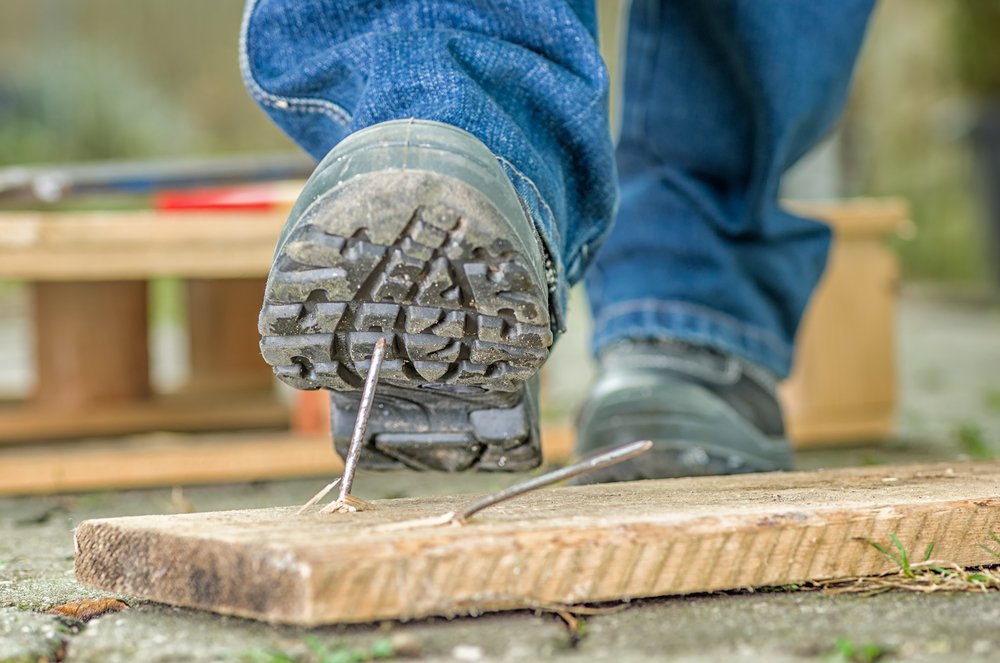Table of Contents (click to expand)
Yes, you can get tetanus if you step on a rusty nail.
Accidents happen all the time, and they happen in all different forms.
When you hear about an accident, it’s more commonly associated with a tragedy on the road or some other unfortunate event, but there are certain small, seemingly innocuous accidents that also happen constantly. Stepping on a rusty nail is one such accident.
What Is Tetanus?
Tetanus, which is also known as lockjaw, is a type of infection typically associated with being injured by some sharp object, such as knife, needle, or rusty nail. The reason it is also known as lockjaw is because one of the basic symptoms of tetanus comes in the form of contractions in the muscles around the mouth. The jaw seems to be ‘locked’ due to very little movement, hence the name.

These muscle contractions can often spread to other parts of the body, causing uncontrolled spasms. Some of these spasms are so strong that they can cause fractures, so tetanus is clearly nothing to fool around with. Furthermore, someone suffering from tetanus may have trouble swallowing and breathing, and may experience irritability, drooling, abnormal sweating and fever.
Also Read: What Are The Most Dangerous Chemical Substances Known To Man?
What Causes Tetanus?
Tetanus is caused by a spore-forming bacillus named Clostridium tetani. The bad news is that this bacterium is found quite commonly all over the world. These bacteria may be found in soil, feces, dust or even on the skin of human beings.
Now, let’s talk about how this all connects to blades and rusty nails. It’s important to note that these warnings aren’t limited to rusty nails; even perfectly new and polished ones (if they puncture the skin) can cause a deep wound that may lead to tetanus. Why is that? Let’s dig into the details…
Also Read: Why Does Rabies Cause Fear Of Water?
How Does The Process Work?
The bacteria, C. tetani, can grow and reproduce only in the absence of oxygen. This bacterium enters the body through the wound, where there is an abundance of contamination and dead skin cells, as well as a deprivation of good oxygen flow. These puncture wounds can be caused by anything, including needles, animal bites, broken glass, knives, wood splinters or nails.

Once the bacteria enter the wound, they release a neurotoxin known as tetanospasmi, which is an extremely strong toxin. Even a small amount of this lethal toxin can cause significant muscle contractions all over the body, such as the ones people commonly experiences when suffering from tetanus.
Why Are Rusty Objects Considered More Dangerous?
If an object is able to puncture your skin, then it can potentially cause tetanus. The reason why rusty nails are often blamed more than other objects is that due to the exposure of the nail to air, water and soil from the surroundings, the tetanus-causing bacteria can enter the nail and hide there, almost guaranteeing that the bacteria will enter the body. Any piercing injury should be looked at carefully, not just the ones caused by rusty metallic objects, but the chances of contracting tetanus are much higher with those rusted materials.
It is also important to note that cleaning the wound with normal disinfectant won’t help much, as spores of C. tetani are resistant to antiseptics. The best thing you can do is head to the nearest hospital, where you will be given an antitoxin known as tetanus immunoglobulin.

Now that you know the whole story, don’t blame old, rusty needles and nails for tetanus; they’re just carriers for this dangerous bacteria. And remember, even an innocuous cut or scratch by a brand-new material can also be just as deadly. Take a trip to the hospital just to make sure!
How well do you understand the article above!

References (click to expand)
- If you step on a rusty nail, will you really get tetanus?. HowStuffWorks
- How to Know when You Need a Tetanus Shot - wikiHow. wikiHow
- Cut by rusty metal! Do I need a tetanus shot? - Go Ask Alice!. Columbia University
- I stepped on a nail. Do I need a tetanus shot? | BuckMD Blog. The Ohio State University
